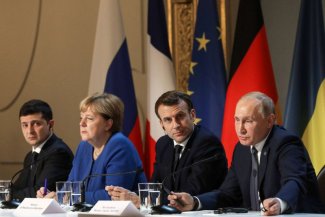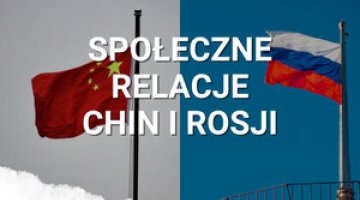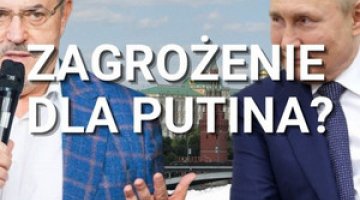No breakthrough at the Normandy Four summit in Paris

On 9 December, a meeting of the leaders of Ukraine, Russia, France and Germany was held in Paris under the so-called “Normandy Format” dedicated to resolving the conflict in eastern Ukraine. This was the first such meeting since 2016. The talks of the “Normandy Four” were followed by the first bilateral meeting of the presidents of Russia and Ukraine (which lasted around 15 minutes) and by a meeting of the two leaders with working groups (which lasted almost 1.5 hours).
The Ukrainian delegation included Andriy Yermak, President Zelensky’s chief international contact advisor, Foreign Minister Vadym Prystaiko, Minister of the Interior Arsen Avakov, Energy Minister Oleksiy Orzhel and Yuriy Vitrenko, Executive Director at Naftogaz. The Russian delegation was composed of Foreign Minister Sergei Lavrov, the President’s Spokesman Dmitri Peskov, the presidential advisors Vladislav Surkov and Yuriy Ushakov, Energy Minister Aleksandr Novak and Gazprom’s CEO Aleksey Miller. The presence of officials responsible for energy affairs was due to the fact that the topics of talks between the presidents of Ukraine and Russia included the conditions for prolonging the current contract for the transit of Russian gas via Ukraine and Ukraine purchasing this gas, or concluding a new one. (The present contract expires on 1 January 2020).
The main subject of the talks involved the resolution of the conflict in the Donbass. The only result of these talks has been a joint statement signed by the leaders in which they confirmed that the Minsk agreements signed back in February 2015 form the basis of this process. The parties agreed that:
- a complete ceasefire will be achieved by the end of 2019 and an updated demining plan will be implemented ;
- the conflict participants’ armed forces will be withdrawn from three subsequent disengagement areas by the end of March 2020;
- the OSCE Special Monitoring Mission mandate in the conflict region will be expanded to include non-stop patrolling activities (a proposal to enable the mission to gain access to the entire conflict region was also discussed);
- an exchange of conflict related detainees in the “all for all” formula will be carried out by the end of the year and the International Committee of the Red Cross will have full access to all the imprisoned individuals;
- a law will be enacted to grant portions of the Luhansk and Donetsk regions a permanent special status in line with the Minsk agreements from 2015;
- the so-called Steinmeier formula (which regulates the two-step process of implementing special status for portions of the Donbass combined with the holding of local elections there) have to be confirmed and included in the Ukrainian legislation;
- political and military details regarding the implementation of the Minsk agreements will be agreed within four months; after this deadline, regardless of the progress made, another summit in the Normandy Format will be held with no prerequisites.
When replying to questions from journalists, Zelensky said that Ukraine and Russia had divergent points of view as regards the parameters and the timeframe of the elections in the occupied portions of the Donbass. Kyiv is of the opinion that these elections can only be held once Ukraine regains control of the border. Zelensky went on to say that he would not allow any federalisation of Ukraine to happen and would not let any external pressure decide on the Ukrainian state’s foreign policy directions.
The talks regarding the conditions for gas transit and supplies to Ukraine have brought no results. During the press conference, President Putin stressed that Russia is ready to offer gas to Kyiv at a price 25% lower than the current price Ukraine pays for the gas it imports from Western suppliers. Vitrenko, for his part, stated that “an agreement has been reached as to the further progress of the negotiations” and stressed that Ukraine would strive to have the ruling of the Arbitration Court in Stockholm enforced (according to which Gazprom is obliged pay US$ 2.9 billion with interest to Naftogaz). The EU leaders did not offer any statements regarding energy issues.
Commentary
- The meeting of the Normandy Format leaders has brought no breakthrough in any of the key issues connected with the efforts to resolve the conflict in the Donbass. A breakthrough would require major concessions from Russia or from Ukraine. At present, neither country is ready to make any concessions as their takes on how the conflict could be settled are unequivocally descrapant. due to their conflicting interests. However, the first direct conversation between the presidents of Ukraine and Russia, both in the bilateral and quadrilateral format, was held in a productive atmosphere. Both leaders had different motivations for this. It was in Zelensky’s interest to create the impression that the peace process has been unblocked as this was a promise he had made during his electoral campaign. This also involved avoiding excessive concessions which are not welcome in Ukrainian society. Putin’s goal was to normalise Russia’s relations with the West, to have the EU sanctions at least eased and to launch a process which in some time will result in Ukraine being forced to unilaterally implement the Minsk agreements.
- It should be expected that at least some of the decisions made in Paris will be implemented and another Normandy Format summit will be held within four months. At the same time, it seems unlikely that a permanent ceasefire will be achieved by the end of 2019 because Russia views the continuation of limited military action as its main instrument of pressure on Kyiv and the West.
- The meeting should be viewed as a moderate success for Ukraine as regards the interpretation of the Minsk agreements. The announced continuation of the withdrawal of troops from another three locations along the demarcation line, the expansion of the OSCE’s activity and the exchange of prisoners of war are de facto tantamount to adopting the Ukrainian version of the agreements’ implementation at the present stage. This version involves the primacy of the implementation of security-related provisions (ceasefire, withdrawal of troops) over the political issues (including the organisation of early local elections).
- When Zelensky returns to Ukraine, his political position will be stronger – he did not agree to any concessions as regards strategic issues and emphasised Kyiv’s non-negotiable “red lines” (the absence of consent to federalisation and to the abandonment of the pro-Western orientation in Ukraine’s foreign policy, as well as his hard-line stance regarding the state’s territorial integrity inclusive of Crimea). He intended to demonstrate that he was not striving for an agreement with Russia at any cost in order to achieve immediate results (which is what a portion of the opposition is accusing him of), although he is delivering on his key electoral promise which involved resuming talks with Russia at the highest level to put an end to the war in the Donbass.
- Russia had no major expectations as regards the results of the Normandy summit and mainly agreed to attend it to demonstrate its good will and to make a friendly gesture towards the summit’s host, i.e. France’s President Emmanuel Macron. Faced with domestic problems (declining approval ratings, protests), Macron intends to demonstrate his effectiveness in foreign policy to his voters, posing as Europe’s leader. Moscow is hoping that in a situation where the major EU states are exhibiting mounting fatigue with the conflict in the Donbass and in connection with their readiness to normalise their relations with Russia, this will result in a gradual alleviation of the Western-imposed sanctions which are harmful to the Russian economy.
- Russia has failed to attain its main goals, including failing to force Ukraine to fully implement the political provisions of the Minsk agreements (in their extended interpretation) prior to ending military action and transferring only formal control of the region to Ukraine. Despite this, the course of the summit and the decisions made during it can be viewed as a minor success for Russia. The following aspects are favourable for the Kremlin: the fact that Kyiv reiterated its commitment to include the so-called Steinmeier formula in the Ukrainian legislation and to prolong (perhaps indefinitely) the validity of the law on special status of the occupied territories of the Donbass. This steps up political pressure on Kyiv to set the date of local elections in the Donbass (Ukraine will be trying to put it off). In this way, Moscow is making attempts to gradually impose federalisation on Ukraine and to legitimise the separatists (through the local elections). As president Putin stressed during the press conference, Russia’s overriding goals continue to be as follows: to have Kyiv recognise the Moscow-controlled Donbass separatists as the main party to direct talks on the conflict’s resolution, and to commit Ukraine to declare an amnesty. It is likely that Russia will exert pressure on Ukraine to meet these demands later in the negotiations.
- The long-term goals of Russia’s policy towards Ukraine remain unchanged and include blocking the reform process and rapprochement with the West, followed by Russia regaining its influence in Ukraine. Russia is also striving to have Kyiv recognise the annexation of Crimea and to use the Donbass as an instrument of pressure on the Ukrainian state. In this context, it is worth noting that in their comments on the course of the summit, the Russian media interpreted the fact that the omission of the Crimea issue was a success for Russia and “the victory of common sense”, allegedly proving that Ukraine has come to terms with the idea that the annexation is irrevocable.
- By combining the talks on resolving the situation in the Donbass with the talks on Ukraine purchasing gas and the transit of gas via its territory, Russia intended to improve its negotiating position and to force Kyiv to make concessions. By combining these two topics during one meeting, Russia wanted to encourage the Western countries to put pressure on Kyiv to submit to Russia’s conditions and refrain from disrupting the agreement regarding an issue which is of major interest to the EU states. The absence of compromise in this field indicates that – despite press leaks suggesting that an agreement was almost ready – both sides were not willing to make concessions and any further negotiations will be held under time pressure (the contract will expire on 1 January 2020). However, there are many indications that at present Russia’s gas debt to Ukraine is the most important of all the contentious issues. Statements by Russian officials suggest that they repeatedly called on Kyiv to drop its claims resulting from the arbitration court rulings issued in 2017 and 2018 (at present the amount of these claims along with interest is around US$ 3 billion). Statements by president Zelensky indicate that Ukraine is not going to refrain from collecting this debt. However, it is ready to agree to Gazprom paying off its debt by supplying gas to Ukraine.




